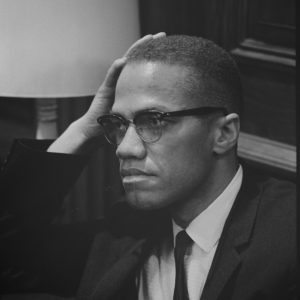This piece was co-authored by Akili, project coordinator, and Michél Legendre, former director of tobacco campaign.
Happy Birthday, Kuzaliwa, to El-Hajj Malik El-Shabazz, also known as Malcolm X.
Born on May 19, 1925, Malcolm X remains a powerful figure in the history of the U.S. and the global struggle for Black liberation. Of his many insightful critiques of the systems of white supremacy and racism, he continues to be recognized for his anti-capitalist and anti-imperialist views in service of his advocacy for justice globally. While Malcolm X was viewed as ‘radical’ for all of his teachings then, it’s important to remember and reflect on what continues to make him relevant to so many people today.
Early on, he opposed the war in Vietnam, became a leading figure for Black nationalism, and continuously shone a light on the roots of the problems. Many of Malcolm’s best moments are the ones where he refused to answer the questions that were being asked, instead choosing to tell the story of the Black peoples’ victimization, oppression, and what should be done to lift the foot off the neck of Black people.
Malcolm’s analysis and understanding of class and race came from his life experiences. His leadership in and relationship with the Nation of Islam shaped him as well. Malcolm X was a moral and authentic leader who spoke to the needs, interests, and concerns of Black people in strong and forceful terms. As Ossie Davis said at Malcolm X’s funeral, “a Prince — our own Black shining Prince! –,” Malcolm’s message was powerful for Black people.
Because of his positions and work, Malcolm X was well-known and exposed how systemic racism works in America. He understood that capitalism, white supremacy, and imperialism were integral to the ‘divide and conquer’ strategy that prevented people of the global majority from organizing across identities. Following his 1964 pilgrimage to Mecca, Malcolm embraced direct action and other methods of engagement to uplift and advance the demands of Black people, for human rights.
Despite his productive, complex, and nuanced life, Malcolm X’s reputation has been increasingly white-washed, simplified, and sanitized.
Making Malcolm mainstream cuts away his rough edges and poignant critiques of the very system that aims to swallow the entire human and civil rights movement whole. But Malcolm’s thinking is as sharp and relevant today as it was in the Sixties.
Malcolm X was made a martyr for holding a strong belief that capitalism, the governments that advance its worst abuses and highest levels of exploitation, and the entities that benefit from and proliferate its strength continue to work in tandem with white supremacy, imperialism, and globalization to take and oppress as much as they can. The result of this multi-pronged system of oppression is the continued injustice against the people of the global majority — Black, Indigenous, and people of color.
Today, we remember and celebrate the life, lessons, and successes of Malcolm X, El-Hajj Malik El-Shabazz — his profound impact in shifting how we view systems of racism and oppression, and his advocacy for justice that amends not just inequality but also inequity.
Photo credit: pingnews.com on Flickr (link).







